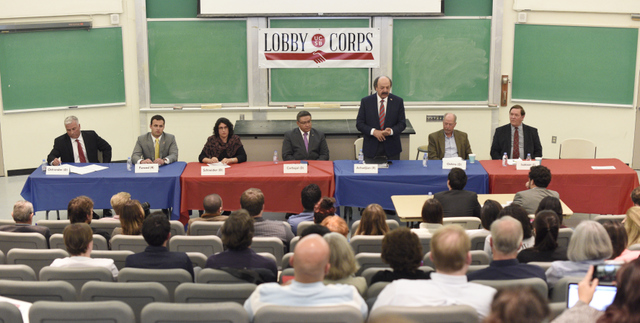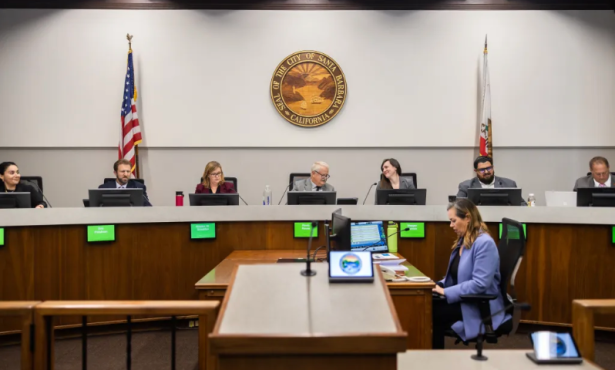Some Sparks Fly in Third Congressional Debate
Seven Out of 11 in Race for Lois Capps's Seat Take Questions at UCSB

In the third debate in the congressional race, seven hopefuls mostly played nice, but they sparred over the Iran nuclear deal, campaign contributions, and the Affordable Care Act.
Helene Schneider, the Democratic Santa Barbara mayor, asserted she would not have supported the Iran deal, the agreement Iran signed with the United States and five other nations in exchange for lifting economic sanctions. Schneider described the deal as “losing our leverage within the Middle East.”
The topic might be the first national issue to separate Schneider from Dem rival Supervisor Salud Carbajal, who said he knows “firsthand what’s in war.” “The Iran deal achieved … us not going to war and reducing nuclear access,” he said. (The two conservative frontrunners, Katcho Achadjian and Justin Fareed, dismissed the agreement. “There was no deal,” Achadjian charged.)
The Iran deal came up in response to a question about the candidates’ opinion of Congressmember Lois Capps, who has represented the Central Coast for nearly 18 years. Last year, her announcement she’d retire at the end of this term prompted a flurry of candidates to throw their hats in the ring.
Of all 11 candidates in the race, seven attended Thursday’s debate, which was put on by UCSB’s Associated Students Lobby Corps. Four Democrats (Carbajal, Schneider, Jeff Oshins, Bill Ostrander), two Republicans (Achadjian, Fareed), and one Independent (Steve Isakson) were at the table. Next Friday is the last day for a candidate to get in the race.
Ostrander has used his campaign to harp on money in politics, and he was almost giddy when asked about Citizens United, the controversial ruling that allows unlimited spending by corporations in federal races. “Oh, I love this question,” he began. Ostrander suggested it was the country’s most egregious verdict outside of the Dred Scott decision. He exclaimed he was the only candidate who has not received PAC or super-PAC money, excluding Oshins and Isakson. He criticized Carbajal — “a nice man,” he conceded — for his hefty war chest.
Carbajal has raised the most money by far — $1.4 million — through the end of last year, the latest official records available. To contrast, Ostrander received $20,317. In a rebuttal, Carbajal said he was “100 percent against” Citizens United and was proud of the broad support his campaign has garnered. “We need to do everything we can to keep this seat blue,” he said.
Schneider also lamented that it is “insane” the amount of money candidates need to raise to be considered credible by the establishment in D.C. Through last quarter, she raised $479,183. In a similar school of thought, Oshins warned the audience they would soon be bombarded with ads and TV commercials given the amount of money involved in this race.
Over the course of the evening, Ostrander, who stood up as he spoke (practically yelling at times), elicited several loud cheers from the audience, many college students yielding Bernie Sanders signs. He snapped at Fareed, who called the Affordable Care Act “a prime example of partisan politics” and “the largest federal boondoggle in history.”
“Things like that drive me insane,” Ostrander charged, contending Republicans walked away from Affordable Care Act discussions. He called health care a “right” not a “privilege.” “Sure the Affordable Care Act needs improvement,” he said. “But, dammit, get these Republicans involved. What we really should have is universal health care.”
On health care, Achadjian, who owns a string of gas stations in San Luis Obispo, said the act initially offered “everything and anything to everyone.” He criticized President Barack Obama for promising people could keep their health care. “That wasn’t the case,” he said. Instead, he called for insurance to be sold across state borders, a position Fareed shared.
Fareed also criticized Capps for being one of the Democratic members of Congress who skipped Israeli Prime Minister Benjamin Netanyahu’s controversial speech to Congress last year. And he spoke often of partisan gridlock in DC. “What we need to do is reevaluate from a systemic perspective,” he said.
Asked about immigration, Isakson said certainly there is a lot of talk about building a wall at the southern border. “As an engineer, that doesn’t sound practical to me.” He advocated for secure borders and a path to citizenship for people who have contributed to society.
Oshins, soft-spoken and appearing almost apathetic, said he probably will lose in the June election but has made his campaign largely about student loan debt. In talking with people on campuses, Oshins said, he meets some DREAMers, as students without U.S. resident status are known. “It is just inhumane not to do something about immigration,” he said, noting the refugee crisis in Europe.
Achadjian, who immigrated to the United States from Lebanon in 1971, called for securing the borders “because of terrorism” and for heightened security. He said he is willing to help people who are here to make an honest living.
Also an immigrant, Carbajal moved to the U.S. from Mexico at age 5. He advocated for fixing the “broken system” to allow people to “come out of the shadows.” Specifically, he supported a pathway to citizenship with stringent background checks. He also called for secure borders. Carbajal cited studies that indicate immigrants greatly benefit nations.
Adding to that, Ostrader said he has yet to see Caucasians picking vegetables in the fields. “Everyone in this room is an immigrant,” he said. “It is unbelievable to me that there is such hostility, and we look at them as if they’re criminals.”
The next debate is set for April 23 at Cuesta College.



